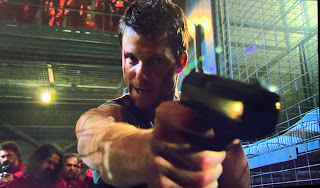-Colonel Saul Tigh-



Pop rock icon Rick Springfield (remember, he's done everything for you and created some great music too) once played the cameo role of Apollo's brother Zak Adama in the classic Battlestar Galactica.
Maybe it's because he became a pop star but Springfield was instantly memorable in his brief cameo in Saga Of A Star World once upon a time. Here, the character is replaced by an unmemorable actor to serve the story in Battlestar Galactica, Season One, Episode 4, Act Of Contrition. Though the Zak character is given more depth here given he had a relationship with Starbuck in the Ronald D. Moore rendering as well as being son to Commander Adama and brother to Apollo.

In Larson's series he was just the young hot shot side kick brother of Apollo. A boy among young men.
Zak was the brother of Lee "Apollo" Adama, son of William Adama, lover of Lt. Kara "Starbuck" Thrace. Kara was Zak's girl (not Jesse's girl).

The story centers on Starbuck's guilt who once passed an inadequate Zak Adama in his basic flight training simply because they were lovers. As a result he was ill-prepared and was killed in action. Starbuck reveals this fact to Lee/Apollo in the Mini-Series. Her action indirectly resulted in his death.

Following an incident in the hanger bay and the death of seven pilots, Commander Adama needs his best pilot to train new recruits echoing a moment in the original series whereby Starbuck and Apollo had to train all new female recruits in Lost Planet Of The Gods due to an on board illness striking its male crew of pilots. How about that a gender specific illness. #Metoo might revel in such a possibility.
In Moore's Battlestar Galactica, the funeral of those pilots is juxtaposed throughout the entry with the funeral of Zak Adama.

As an act of contrition Starbuck yields to the request in an emotional episode and one that really cemented the work of Katee Sackhoff for this writer in here role for the series. This episode along with her performance in the next entry, You Can't Go Home Again (the initial setup of which begins here in Act Of Contrition), made this science fiction fan a fan of her work for years to come including her supporting role on Longmire (2012-2017) and her new science fiction series Another Life (2019-present).

To that end and point, the penultimate scene in the entry between William Adama and Starbuck is emotionally raw as she unveils her guilt, emotion and unabashed contrition to the father of the late Zak Adama. What the viewer experiences here is something that will be different for everyone. William Adama's response to her contrition is powerful and brutal to watch. Each and every human being watching will have a different reaction to this moving exchange and it is the true highlight in Act Of Contrition.

With the pilot numbers depleted, the Galactica is desperate for new blood. Starbuck is unmerciful as the instructor as she punishes the recruits as well as herself for allowing Zak to pass ultimately leading to his untimely death.

In the final minutes of Act Of Contrition a group of Cylon Raiders returns damaging Starbuck's Viper II and sending her spinning toward the planet below setting the series up for one of the series most intense, focused stories of personal survival. Starbuck's story and thread of contrition To Be Continued in You Can't Go Home Again.
Writer: Bradley Thompson/ David Weddle. Director: Rod Hardy.







































